

Q U A R T E R L Y N E W S L E T T E R
IN THIS ISSUE:
Baltimore HIPPY Taps Parent Experience for Home Visitor Program
Reimagining Family Recovery in America’s Opioid Crisis
Building Stronger Youth Development Systems
Securing Housing Stability
A Path Forward for Baltimore Families
BY MELISSA MOORE, FAMILY LEAGUE SR. DIRECTOR FOR COMMUNITY IMPACT
Stable housing creates the foundation families need to thrive. As our recently completed evaluation of Family League's Home Visiting Housing Support Program (HSP) demonstrates, providing targeted financial support alongside comprehensive services can transform lives and strengthen entire communities.
Evidence of Program Success
Over the past three years, we've witnessed firsthand how monthly housing stipends, combined with our established home visiting programs, have created pathways to stability for hundreds of Baltimore families. The evaluation, conducted by Amaka Consulting and Evaluation Services, analyzed feedback from 380 program participants and revealed compelling outcomes that reinforce our community impact strategy.
What makes these findings particularly meaningful is the overwhelming positive response from participating families. An impressive 92% of participants reported that the housing support improved their family's ability to function, with two-thirds strongly endorsing this impact. These numbers tell a powerful story of transformation, but the real impact goes far beyond statistics.
Strategic Partnerships Expand Community Reach
Through our network of four dedicated home visiting partners - DRUM Healthy Families, The Family Tree, HOPE Project of Roberta's House, and Sinai Hospital of Baltimore - we've been able to reach diverse communities across the city. Each partner brings unique strengths to the program: DRUM serves approximately 200 families annually as Maryland's largest Healthy Families America program; The Family Tree provides specialized support to
Spanish-speaking pregnant individuals; HOPE Project focuses on families experiencing fetal or infant loss; and Sinai Hospital serves 45 families through their Community Health initiatives.
The program's success lies in its practical approach to supporting families. Participants primarily use their monthly stipends for essential housing expenses, with many focusing on rental payments and utilities. Importantly, we've seen families building financial resilience by establishing savings accounts and covering moving expensessteps that contribute to long-term stability.
Building a More Resilient Baltimore
This initiative aligns seamlessly with other city-wide efforts, including Mayor Brandon Scott's Baltimore Young Families Success Fund pilot project. Together, these programs represent a comprehensive approach to addressing systemic inequities and supporting Baltimore families.
None of this would be possible without our strong funding partnerships. Support from the Baltimore Children and Youth Fund, along with funding from the Children's Cabinet Interagency Fund administered by the Governor's Office of Crime Prevention, Youth, and Victim Services and the Governor's Office of Children, has been instrumental in our ability to provide this crucial assistance.
While we're encouraged by the program's success, we remain committed to continuous improvement. Our evaluation identified opportunities to enhance payment distribution systems, and we're actively working with our partners to implement these improvements.
The Housing Support Program represents more than just financial assistance - it's a testament to what's possible when we invest in families' basic needs. As we look to the
WINTER 2024
future, we're more convinced than ever that supporting housing stability creates ripple effects that strengthen not just individual families, but entire communities. Together, we're building a stronger Baltimore by investing in our families' success.
MEET MELISSA MOORE

Melissa Moore is the Senior Director of Community Impact at Family League, where she oversees the organization’s initiatives in maternal and child health, food justice, adaptive village, and interagency investments. In this pivotal role, Melissa ensures the effective implementation of Family League’s mission through strategic leadership and dedicated service.
Since joining Family League in 2012, Melissa has been recognized with the Mayor’s Medallion for Meritorious Service and has demonstrated a strong commitment to enhancing operational efficiencies and fostering a culture aligned with the organization’s core values. A UMBC graduate and a certified Project Management Professional (PMP), Melissa combines her extensive experience with a passion for stewardship.
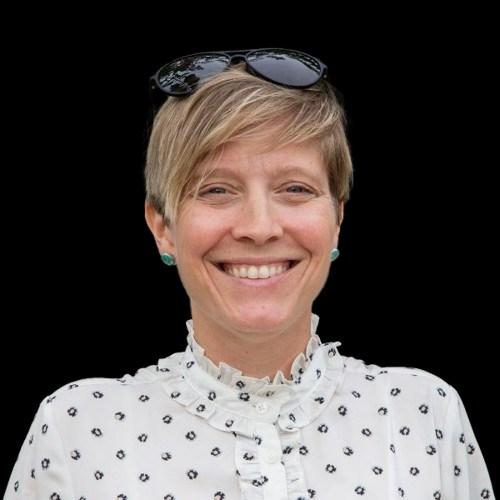

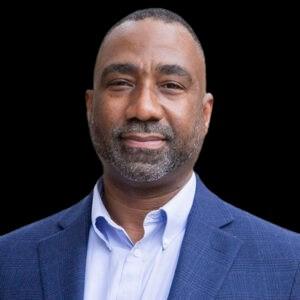

Demaune Millard
A MESSAGE FROM OUR CEO
Together Our Impact Reaches Further
DEMAUNE MILLARD, FAMILY LEAGUE
Dear Friends and Partners of Family League,
As winter settles over Baltimore, I hope you and your family are able to remain warm and well during this season. Our commitment to supporting one another feels especially meaningful during these colder months, as we reflect on the recent accomplishments and the strength of our community bonds. The stories and successes featured in this newsletter showcase the depth of our impact and the strength of our partnerships across the city.
Celebrating Community Achievement
Our recent Annual Meeting in November brought together leaders, partners, and community members to celebrate our shared achievements and this year’s awardees. This gathering reinforced what we've long known: when we combine resources, expertise, and community wisdom, transformative change becomes possible.
This transformative spirit is perfectly exemplified by December's announcement of ENOUGH Initiative awardees. It is great to see that eleven awardees represent Baltimore and Family League is excited to work with each of them this year. Given Governor Moore’s investment, we foresee further community-driven solutions ahead.
Strengthening Family Support Systems
The breadth of work highlighted in this newsletter reflects our comprehensive approach to supporting Baltimore families. Our Home Visiting Housing Support Program has demonstrated remarkable success, with 92% of participants reporting improved family functioning. Thanks to investments made by the Hoffberger Family Philanthropies, HIPPY Baltimore's workforce development initiative has become a model of innovative community empowerment, creating pathways for parents to become professional home visitors while serving 109 families throughout the city.
Our commitment to youth development grows stronger through our partnership with the Wallace Foundation, whose recent study highlights Family League's approaches as a primary Out-of-School Time (OST) intermediary. We've invested over $5.3 million in OST programming, serving more than 3,400 K-12 students across 69 Community Schools. Through strategic collaboration with the Mayor's Office of Children & Family Success, City Schools, and Baltimore City Recreation and Parks, we're further strengthening systems that support year-round learning and enrichment for our city's youth. The success of these efforts is evident in our strong attendance rates and expanding reach across Baltimore's communities.
Advancing Policy and Programs
For the 2025 legislative session, Family League stands ready to advocate for priorities observed across four key pillars: cradle to career education, healthy families, economic security, and safe communities. This framework addresses the interconnected challenges facing Baltimore families, from early childhood education to workforce development.
I am particularly appreciative of the continued efforts happening at the Family Recovery Program, where we're witnessing the power of comprehensive support in helping families overcome substance use challenges. Their success in reducing family reunification timelines while saving taxpayer dollars exemplifies the type of smart, compassionate interventions we champion.
These achievements reflect more than just programs and statistics – they represent real changes in the lives of Baltimore families. As we continue this vital work together, I am filled with optimism about what we can accomplish through our shared commitment to Baltimore's future.
Thank you for your partnership in this important work. Together, we are building a stronger, more equitable Baltimore where every family has the opportunity to thrive.
With gratitude and determination,
Demaune A. Millard President & CEO
Family League proudly stands with Governor Wes Moore and the Governor’s Office for Children involving the first-of-its-kind, ENOUGH Initiative, championing a collaborative approach to dismantling child poverty through strategic, community-driven solutions. As Maryland’s largest Local Management Board (LMB) and Baltimore’s LMB, Family League is supporting 11 local awardees who embody the resilience, innovation, and collective determination of Baltimore’s communities.
“This isn’t just funding it’s a blueprint for transformation,” said Demaune Millard, President and CEO of Family League. “We’ re moving beyond isolated interventions to a holistic approach that amplifies community voices and local expertise. The ENOUGH Initiative represents a pivotal moment in our city’ s ongoing commitment to creating pathways of opportunity for every child.
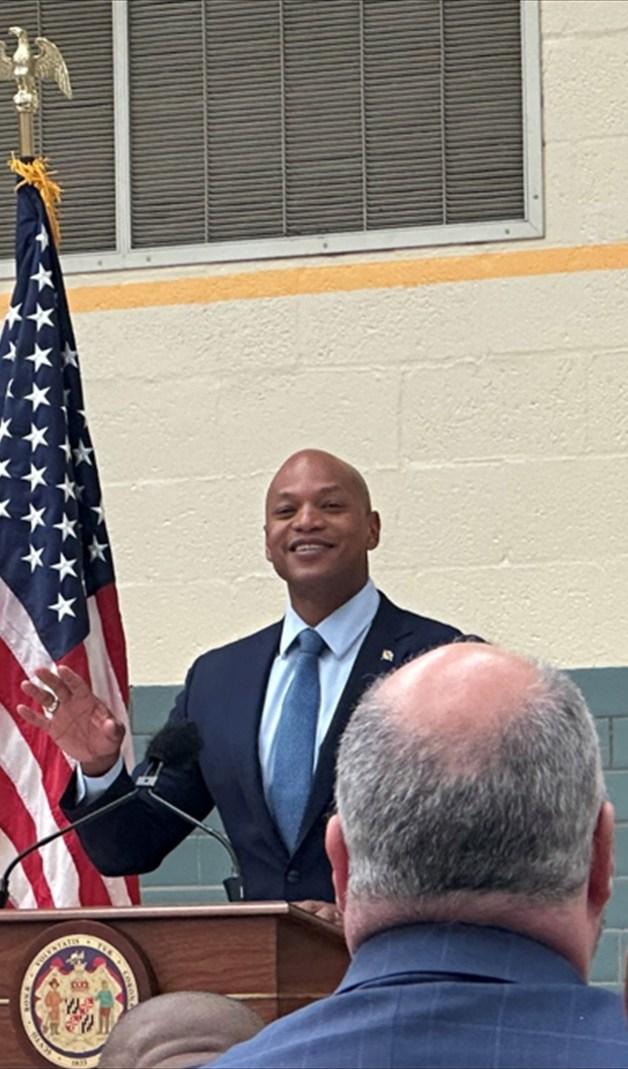

Implementation. For Baltimore, this means a strategic multiyear approach to addressing the root causes of child poverty through targeted, community specific interventions.
Governor Moore's vision resonates deeply with Family League's mission. "We are directly partnering in the work to create safe and thriving communities; support healthy and economically secure families; and ensure access to highquality education," the Governor stated. "Because partnership produces progress – and nothing else does."
Family League remains deeply grateful for the unwavering support of Baltimore City leadership, including Mayor Brandon Scott and the Baltimore City Council. Their steadfast commitment to community driven solutions and strategic invest-
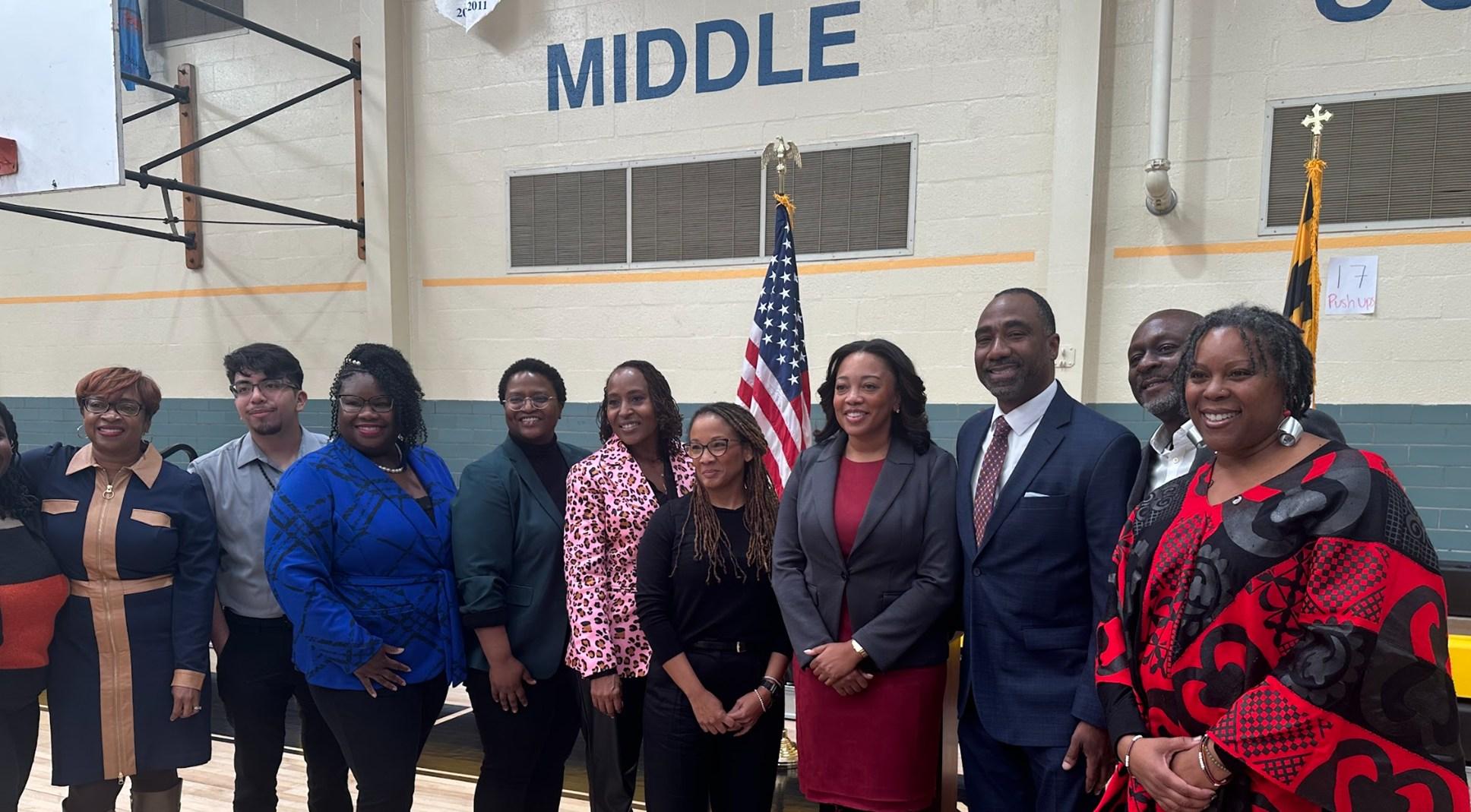

Governor Wes Moore’s visionary initiative has allocated $13.1 million to support communities across Maryland, with Baltimore emerging as a key focal point of this transformative effort. Family League is supporting an impressive cohort of local awardees, including:
Implementation Award Recipients: Cherry Hill Strong, and Park Heights Renaissance
Planning Award Recipients: Child First Authority, Elev8 Baltimore, South Baltimore Community Land Trust, The Central Baltimore Partnership, and The Y in Central Maryland
Partnership Award Recipients: Greater Mondawmin Coordinating Council, Tendea Family Inc., Urban Strategies Inc., and We Our Us
“ENOUGH is more than producing more programming,” Millard emphasized. “ENOUGH is about constructing pathways to economic mobility, access to a quality education, and enhancing the vibrancy of community. These organizations represent the heart of Baltimore resilient, innovative, and deeply committed to creating lasting change.”
The ENOUGH Initiative follows three critical development tracks, Partnership Development, Plan Development, and
in creating the fertile ground from which initiatives like ENOUGH can grow. Mayor Scott's vision for Baltimore rooted in equity, opportunity, and community empowerment aligns seamlessly with the ENOUGH Initiative's goals, demonstrating the city's continued leadership in addressing systemic challenges and creating pathways for our children and families.
Family League congratulates all ENOUGH Initiative awardees and looks forward to supporting their critical work in reimagining opportunities across Baltimore's most challenged neighborhoods.
(LEFT) Insert information, (RIGHT) Inset Information
As the 447th General Assembly legislative session commences, Family League of Baltimore stands ready to advance transformative change for Baltimore's children, families, and communities. Our comprehensive framework addresses four interconnected pillars that form the foundation of family success and community prosperity.
Early Education: Investing in Our Future
The challenges facing Baltimore's early education system demand immediate attention. With families spending up to 41% of their income on childcare and Maryland projected to lose 41% of its family childcare providers by 2026, we're advocating for expanded support through the Child Care Quality Incentive Grant Program and strengthened Childcare Capital Support Revolving Loan Fund. Our $12 million investment in education initiatives has already demonstrated success, with 69 Community Schools providing vital resources and Out-of-School Time Programs supporting over 3,400 K12 students.
Healthy Families: Closing the Health Equity Gap
Our $4.5 million investment in perinatal health initiatives reflects our commitment to addressing critical health disparities. Black mothers in Baltimore face 1.4 times higher rates of preterm births, underscoring the urgent need for expanded maternal healthcare access. Through successful programs like Home Instruction for Parents of Preschool Youngsters (HIPPY) and partnerships with organizations like DRUM Healthy Families and Sinai Hospital, we're creating innovative pathways to improve family health outcomes.
Safe Communities: Building Sustainable Safety
Baltimore's historic progress in reducing violent crime, with homicides reaching their second-lowest level in four decades, demonstrates the impact of comprehensive community safety approaches. Our $1.8 million investment in safety initiatives supports violence prevention, safe passage programs, and trauma response teams. These efforts, combined with addressing housing affordability challenges, create a foundation for sustainable community well-being.
A Framework for Success
Family League's integrated approach recognizes that lasting change requires coordinated action across all these domains. Our framework advances upward mobility through:
• Strategic partnerships that leverage resources and expertise
• Evidence-based programs that deliver measurable results
• Community-driven solutions that address local needs
• Innovative approaches that create sustainable change
As we move forward in 2025, we invite the Maryland General Assembly to join us in supporting these crucial initiatives. Together, we can build a Baltimore where every family has the opportunity to thrive.

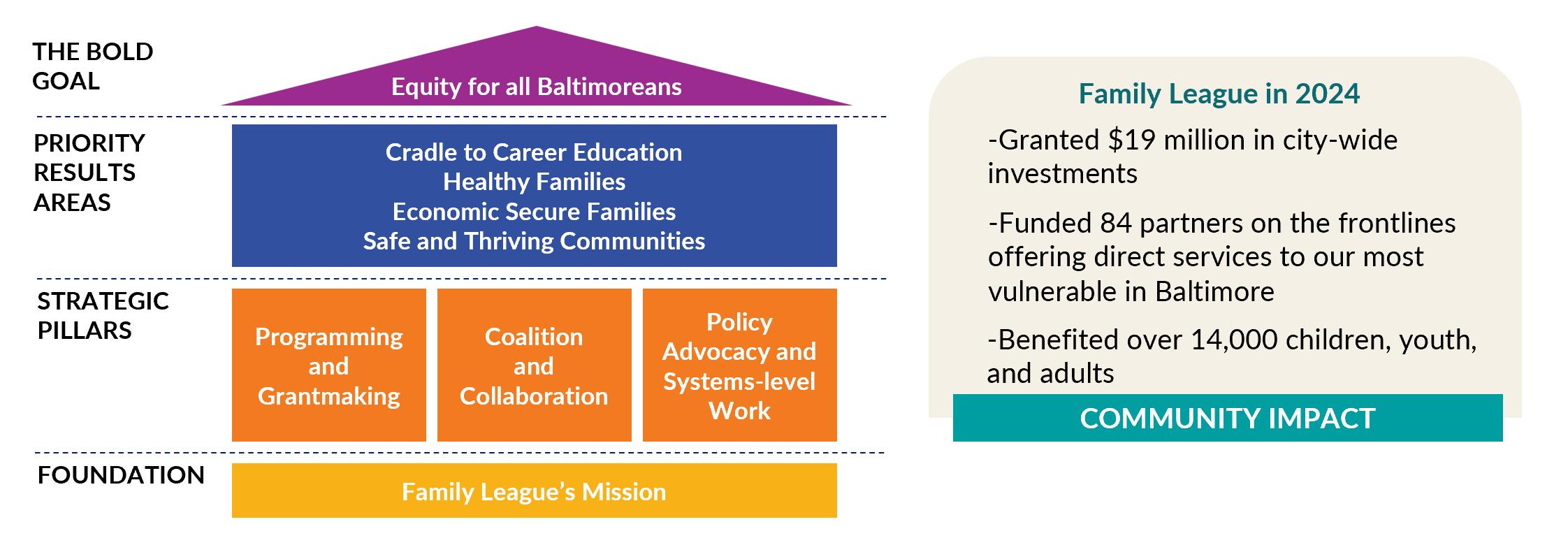
Economic Security: Creating Sustainable Pathways
The ENOUGH Initiative, Governor Moore's groundbreaking $13.1 million investment, represents a transformative approach to addressing poverty in Baltimore, where 19.6% of residents live below the poverty line. Our eleven community partners are pioneering comprehensive approaches across implementation, planning, and partnership tracks. Through strategic collaboration with organizations like Civic Works and JARC Baltimore, we're creating sustainable pathways to familysupporting careers and economic mobility.

Home Instruction for Parents of Preschool Youngsters (HIPPY) has been transforming early childhood education for over five decades, growing from a pioneering research initiative into a globally recognized program now operating in 15 countries. Through HIPPY's family-focused approach, parents receive specialized training, support, and educational materials that enable them to become their child's first and most important teacher, fostering crucial developmental skills through engaging activities in the comfort of their own home.
Baltimore HIPPY Taps Parent Experience for Home Visitor Program
Family League's HIPPY program brings this proven early childhood education model to Baltimore families, empowering them through its developmentally appropriate curriculum designed for children ages 2-5. At the heart of the program are dedicated home visitors who work closely with families from their own communities, providing weekly guidance and support through role-playing educational activities. The program's impact in Baltimore continues to grow, now serving 109 families in fiscal year 2024, with plans to reach 125 families in the coming year. Through carefully crafted activity packets and storybooks, parents learn to create meaningful learning experiences that promote their children's cognitive, social, emotional, and physical development, ensuring they enter kindergarten ready to thrive.
cont. on page 6
Family League funded HIPPY programs have significantly increased the number of families served each year are projected to increase again 2025.
Source: Family League Data and Evaluation
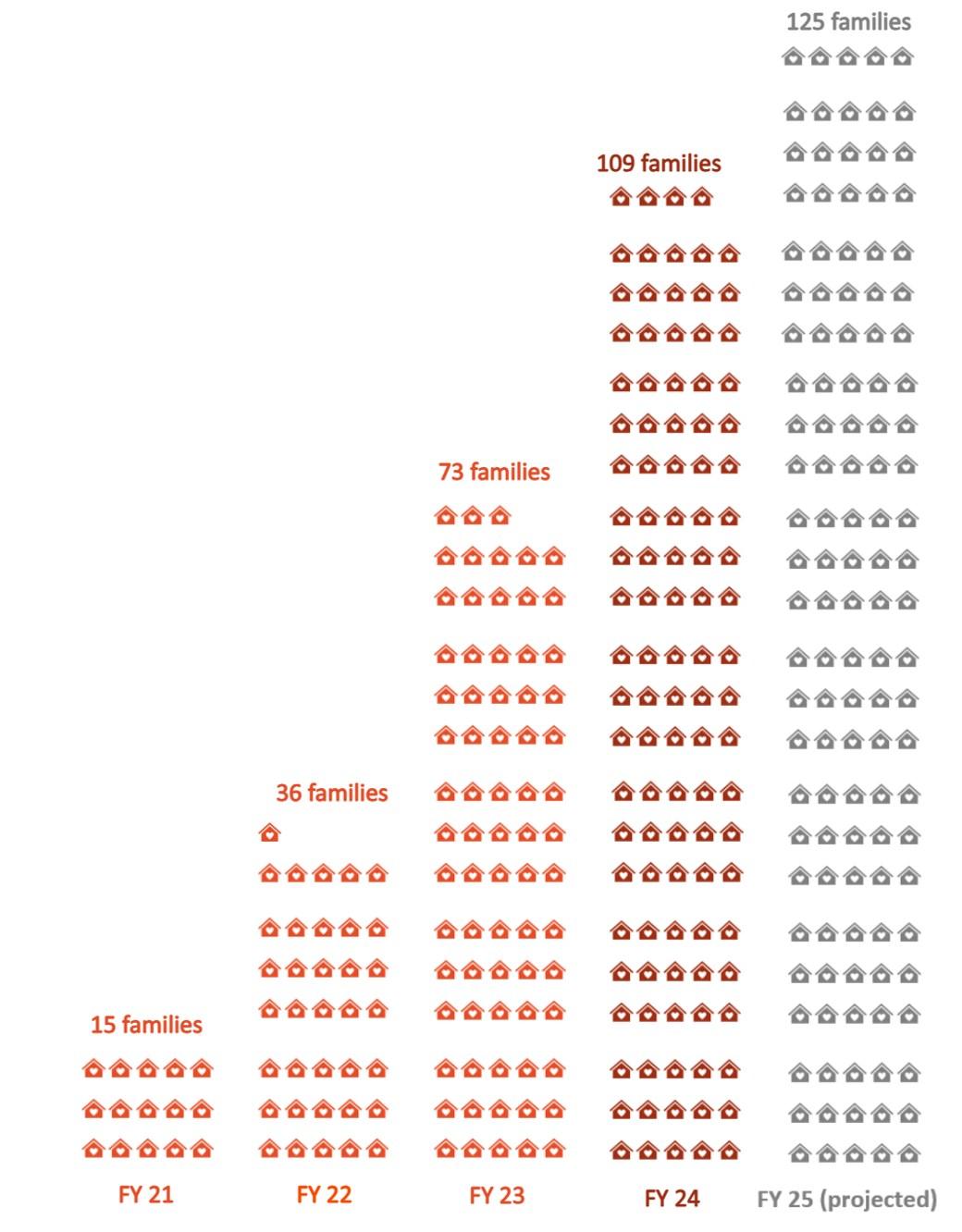

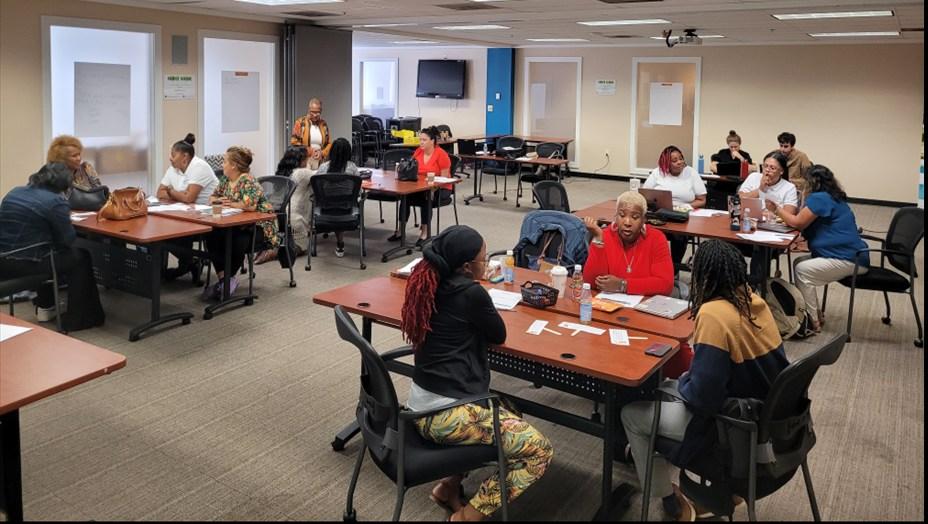
Through partnerships with Park Heights Renaissance, Learning How! Early Childhood Development Center, and UMBC's Sherman STEM Teacher Scholars Program, HIPPY Baltimore is reshaping the landscape of early childhood education.
Impact in 2024
The program achieved continued success in 2024, serving 109 Baltimore families with plans to expand its reach in 2025. Most notably, 100% of surveyed parents reported that the program effectively prepared their children for kindergarten. This remarkable achievement underscores HIPPY's effectiveness in creating strong educational foundations for Baltimore's youngest learners
Introducing the Parent-to-Professional Pipeline
HIPPY Baltimore's workforce development initiative, supported by Hoffberger Family Philanthropies, stands as a testament to innovative community empowerment. The program transforms participating parents into qualified home visitors, creating sustainable employment opportunities within their own communities With a 90% post-program employment rate, this initiative demonstrates the powerful intersection of education and economic opportunity.
Understanding that accessibility is key to success, HIPPY Baltimore has implemented comprehensive support services. The program offers flexible evening sessions in both virtual and inperson formats, along with essential support services including childcare, transportation, and multilingual assistance. This thoughtful approach ensures that all families can participate fully in the program.
National Recognition and Leadership
HIPPY Baltimore's innovative approach has garnered national attention, earning the program a prestigious spot as poster presenters at the upcoming National Home Visiting Summit in Washington, D.C. in February. This platform will allow Baltimore to showcase its unique integration of workforce development and early childhood education to over 700 industry leaders and policymakers.
Family League hosting HIPPY Coordinators and home visitors for Annual Baltimore HIPPY Kick Off Meeting.
A Growing Impact
As co-lead of Baltimore's School Readiness Coalition, alongside Baltimore City Public Schools and the Baltimore City Child Care Coalition, HIPPY is positioned to expand its influence further. With a continued investments planned for FY25, the program is poised to reach more families and continue its mission of empowering parents as their children's first teachers.
A Parent's Perspective
The program's impact is perhaps best captured in the words of its participants. As one parent from the UMBC partnership program shared, "HIPPY showed me how, as a parent, I could better help my child to learn and support their creative expression." Another participant noted, "I enjoy the sense of family that comes with being in the HIPPY program. Everyone treats my family with love and kindness."
Through strategic partnerships, innovative programming, and an unwavering commitment to accessibility, HIPPY Baltimore isn't just preparing children for school – it's empowering families to build stronger futures together. As Baltimore's recognized Early Childhood Advisory Council by the Maryland State Department of Education, the program continues to set new standards for early childhood education while creating lasting change in communities across the city.
Breaking the Cycle: How Baltimore is Reimagining
Family Recovery in America’s Opioid Crisis
In a room for second chances on Baltimore's Gay Street, walls painted in carefully chosen warm colors and sunlight streaming onto meticulously arranged toys create a space where broken families begin to heal. The Extended Time Parenting Room at Family Recovery Program (FRP) represents an opportunity in family reunification, launched amid America's ongoing opioid crisis.
In a city grappling with an overdose rate seven times the national average, this thoughtfully designed space serves as both a sanctuary and a proving ground. Here, parents working to overcome substance use challenges take measured steps toward reclaiming their most precious responsibility: raising their children. Each supervised visit, complete with family activities and healthy snacks, marks another milestone on the path to permanent reunion.
Health, Home, Community, Purpose
"When we talk about SAMHSA's (Substance Abuse and Mental Health Services Administration) four pillars of recovery health, home, community, and purpose we're really talking about rebuilding the entire foundation of family life," explains Dr. Jocelyn Gainers, FRP's President and CEO. Her voice carries the weight of experience as she adds, "Our families aren't just fighting addiction – they're fighting for their children's futures. Each random drug screening, each parenting class, each milestone represents another step toward reunification."
At the heart of FRP's approach lies their mission to "S.E.E." their families – Strengthen those affected by trauma and substance use, Engage them in holistic services, and Equip them with traumainformed skills for resilience. But what truly sets the organization apart is its housing offering for parents.
Home as the Foundation for Change
Through a network of facilities including the Episcopal Housing Corporation Harry and Jeanette Weinberg Building at Sage Center, Sage I, and Sage II at Monarch View, FRP has created more than just shelter – they've built a foundation for lasting change. Since 2016, these facilities, offering more 43 two-and-three-
bedroom apartments, have housed 112 families. The results speak volumes: 84 parents have achieved reunification with their children.
The impact extends far beyond individual families. By reducing the average reunification timeline from 32 months to 18 months, FRP has saved Maryland taxpayers over $24 million in eleven years – funds typically spent on foster care at $37.05 per child per day. "Each family we keep together," Dr. Gainers notes, "represents a break in the cycle of generational trauma that often accompanies the opioid epidemic. When we strengthen one family, we strengthen the entire community."
Family Matters First Year
FRP's journey began modestly in 2005 as an initiative within Family League's portfolio, pioneering a new approach as the first program under the Maryland Opportunity Compact. "From its inception, FRP embodied our belief that transformative change happens when we invest in evidencebased, family-centered solutions," reflects Demaune Millard, President and CEO of Family League.
cont. on page 8

Family Recovery Program participant breakdown includes (63%) Black and African American, (29%) White, (6%) Other (6%) and (2%) Two or More Races.
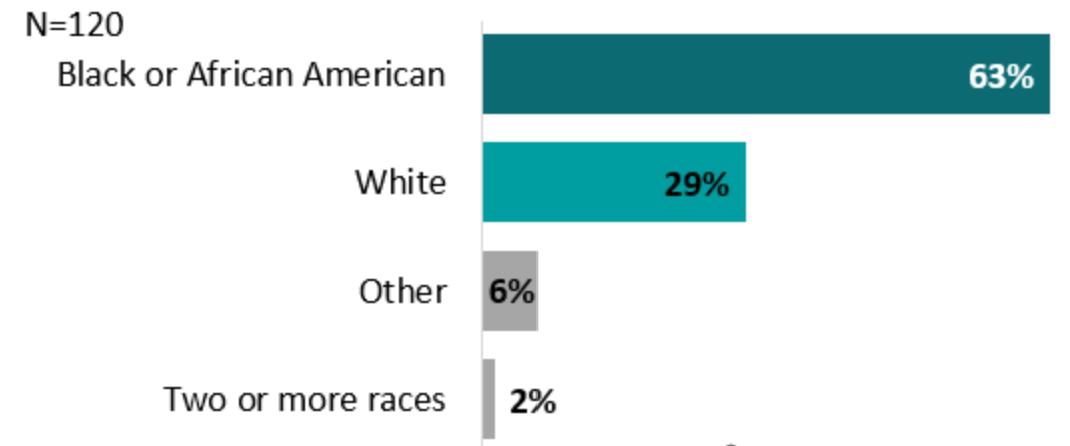
The majority of Family Recovery Program participants were males and averaged 35 years in age.
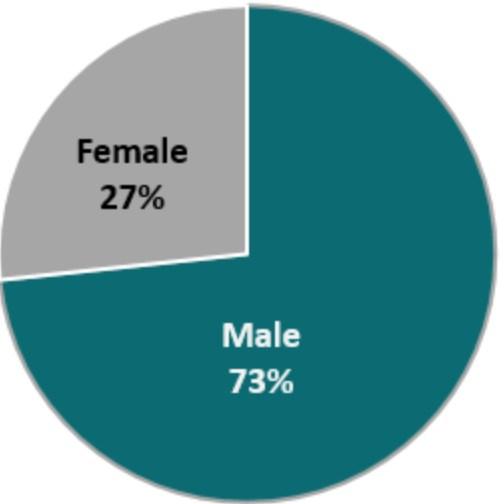
Source: Family League Data and Evaluation

In January 2024, FRP launched its Family Matters initiative, supported by SAMHSA funding. The effort marks a further inclusion of service, now accepting self-referrals and extending beyond court-mandated cases. As Family Matters celebrates its first anniversary, it stands as testament to the power of strategic partnerships, offering comprehensive support from substance use disorder treatment to employment services.
A City's Path to Healing
For Baltimore – a city that comprises just 9% of Maryland's population but shoulders 44% of its overdose burden – the stakes couldn't be higher. As communities across the city grapple with generational trauma, recent landmark settlements with pharmaceutical manufacturers have opened new possibilities for healing. City Solicitor Ebony Thompson, speaking to the Baltimore Sun in June 2024, characterized the settlements as an unprecedented recovery for the city, noting Baltimore's determination to secure meaningful compensation for its residents.
The impact of such broad-scale initiatives ultimately comes down to moments like those unfolding in the Extended Time Parenting Room, where another family works toward reunion. Each supervised visit, every successful reunification, writes another chapter in Baltimore's journey toward recovery. As the city confronts its opioid crisis head-on, the quiet work of rebuilding families continues – one parent, one child, one bond at a time.

Family League s interagency initiatives programming partners with public agencies and human service organizations to establish aligned systems of care and coordinated service delivery for children and families across multiple systems including social services, juvenile justice, mental health, education, law enforcement, and housing. Working closely with city-wide agencies, Family League invests 3.5 million dollars into these Interagency Initiatives and supports the implementation of evidence-based practices and ensures they are reflective of local and national best practices.
INSERT DESCRIPTION OF FAMILY RECOVERY PROGRAMS FACILTIES

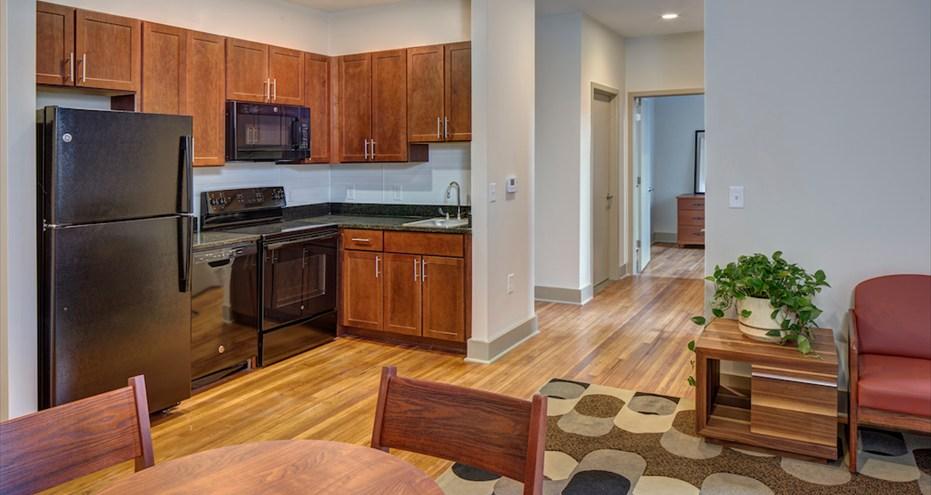
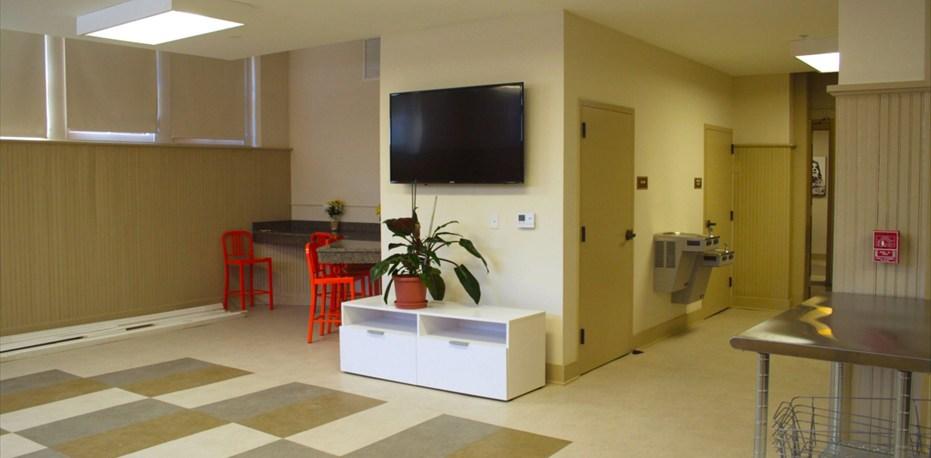
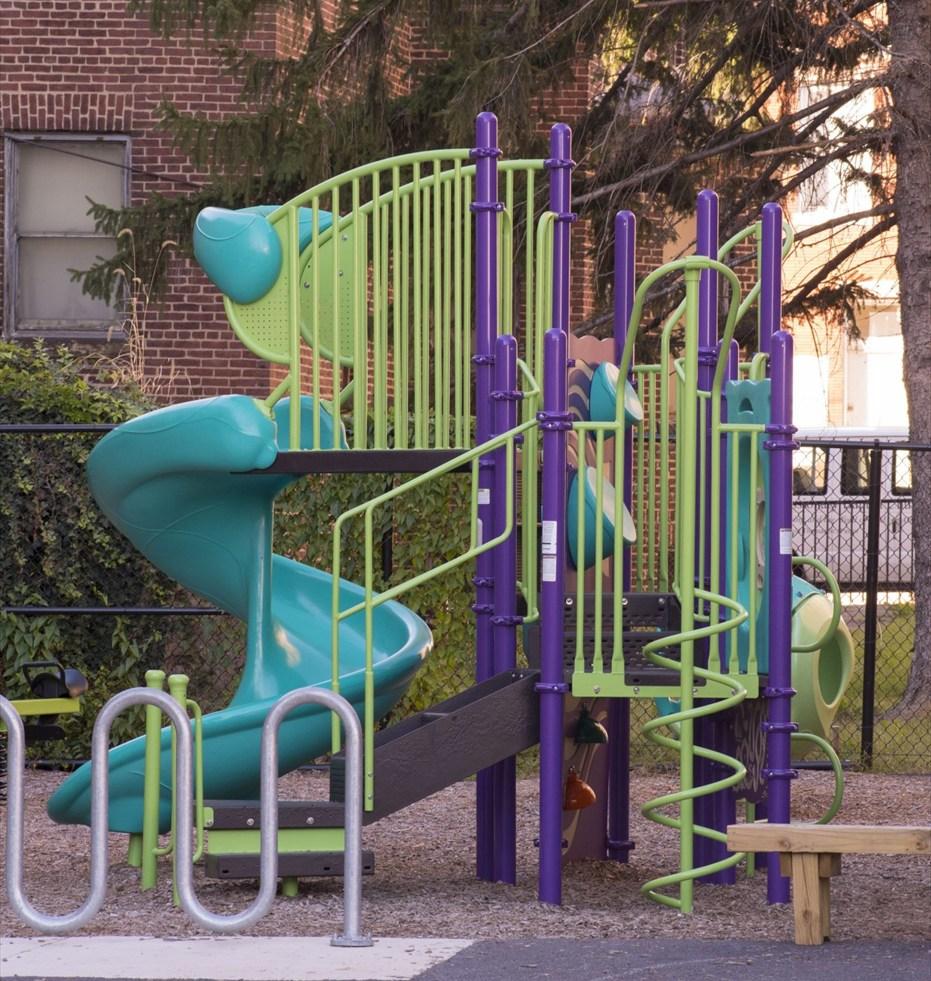
Building Stronger Youth Development Systems
BY JENEE TUCKER, FAMILY LEAGUE SR. DIRECTOR FOR COMMUNITY IMPACT
Family League’s Impact on Baltimore’s Out-of-School Time Programming
When Baltimore, like cities nationwide, confronted the pandemic's seismic shifts, Family League recalibrated its approach to fortifying the city's youth development ecosystem. The organization's resilience as a primary Out-of-School Time (OST) intermediary is now captured in a current Wallace Foundation study examining how Baltimore and eleven other cities reimagined their OST systems amid unprecedented challenges. The research, "Responding, Reimagining, Realizing: Outof-School Time Coordination in a New Era," chronicles the adaptive strategies
MEET JENEE TUCKER
Jenee Tucker is the Senior Director for Community Impact at Family League, where she stewards a $12 million budget to support education initiatives such as School Readiness, Community Schools, and Youth Development programs. With over two decades of experience, Jenee excels in managing evidence-based programs, leading a team of Program Directors, and collaborating with stakeholders to ensure equitable grant-making and program effectiveness.
She joined Family League in 2016, rising through the ranks to her current role in 2024. Previously, Jenee worked with Baltimore City Public Schools and Big Brothers Big Sisters of Central Maryland. A Baltimore native, she holds an M.S. in Project Management from Morgan State University and a B.S. in Criminal Justice from Virginia Union University.

intermediary organizations deployed to meet their communities' emergent needs.
Released in June 2024, the study affirms that the pivotal shifts made by Family League and its peer intermediaries transcend crisis response to become essential frameworks for future operations. Four key coordination areas for intermediaries emerged from the study as guidance: orchestrating systemic professional development, elevating provider voices to decision-makers, cultivating partnerships across the learning and development ecosystem, and advancing racial equity in OST programming. These strategic adaptations forged in crisis but refined through practice offer a playbook for resilient youth support systems that resonate well beyond their pandemic-era origins.
Strengthening Community Partnerships: A Systems Approach
The research team's findings, gathered over two and a half years across multiple U.S. cities by Research for Action and McClanahan Associates, demonstrate how OST intermediaries elevated their response to address intensified community needs. In Baltimore specifically, this work involved the strength of Family League's collaborative partnerships with the Mayor's Office of Children & Family Success (MOCFS), City Schools, Baltimore City Recreation and Parks, and the Maryland Out-of-School Time (MOST) Network.
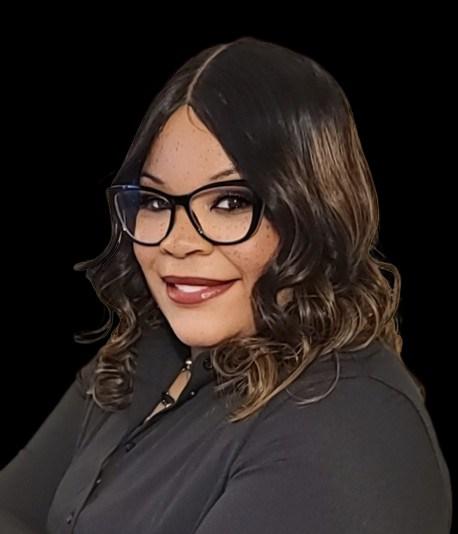

At a panel discussion late Fall, I shared insights about this transformative period, emphasizing how our partnership with MOCFS has been instrumental in systems building. The study points to an expanded role for OST intermediaries, particularly in championing equity in programming and responding to emerging youth needs.
The impact of this systems-level approach is evident in our current reach. Family League invests over $5.3 million to support more than 3,400 K-12 students across 69 Community Schools in Baltimore, including 14 high schools. Our network encompasses 154 Community Schools throughout the city, demonstrating our
our sustained commitment to broadening access to quality educational support.
Expanding Summer Opportunities: Meet-
ing
Diverse Youth Needs
Our summer programming represents another vital focus area, with Family League investing over $1.5 million in diverse youth development initiatives. These programs, implemented across 18 zip codes, served 1,676 youth with an impressive 86% average daily attendance rate. We specifically designed programming to engage middle and high school youth, Opportunity Youth, neurodivergent youth, and LGBTQIA+ youth, offering experiences ranging from college and career readiness to arts and STEM education.
The impact of these investments is evident in numerous success stories. The Bluebird Education Network, Inc. effectively supported kindergarten readiness, while the Village Learning Place cultivated student leadership through innovative socialemotional learning approaches. RICH (Restoring Inner City Hope, Inc.) merged academic enrichment with creative expression, culminating in a student-led fashion show highlighting their graphic design skills. Access Art demonstrated particularly strong outcomes, with over 82% of participants achieving their growth goals.
Professional Development: Strengthening Our Community's Capacity
Professional development continues to anchor our approach at Family League. We recently hosted our Out-of-School Time Community Schools Bi-Monthly Meeting, featuring valuable workshops led by Baltimore City Councilwoman Phylicia Porter and Ellie Mitchell of MOST Network. These sessions focused on building critical competencies in advocacy, policy change, communications, and data-driven decision making.
cont. on page 11

Family League of Baltimore serves as a facilitating partner for the Community School strategy in partnership with Baltimore City Public Schools (City Schools) and the Baltimore Mayor and City Council. The Baltimore Community Schools strategy is composed of two critical components: Community Schools and Out- ofSchool Time (OST) programs. A Community School is a place and a set of strategic partnerships that promote student achievement, positive conditions for learning, and the well-being of families and communities. OST programs provide students with the opportunity to explore new ideas, build 21st century skills, find new talents, and experience success.
T.
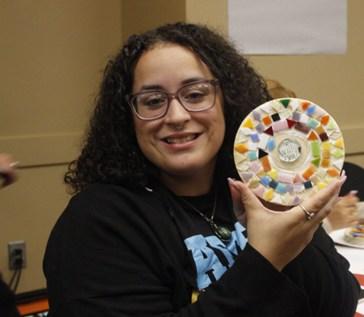

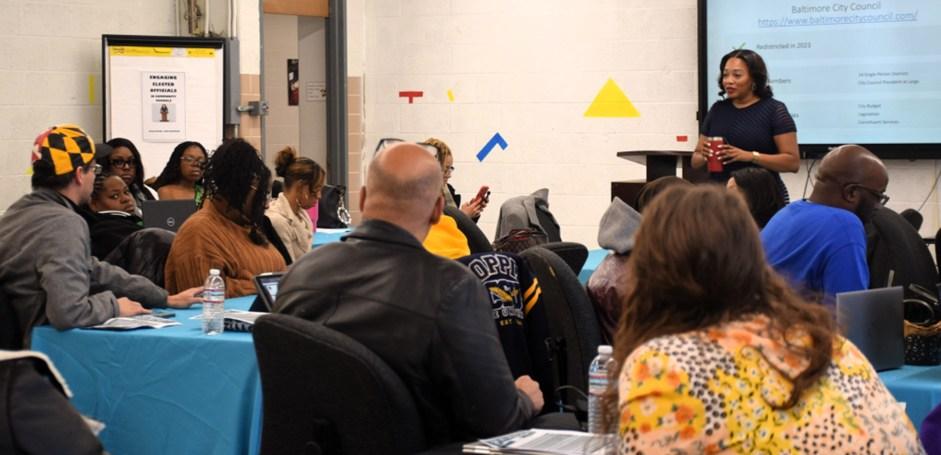


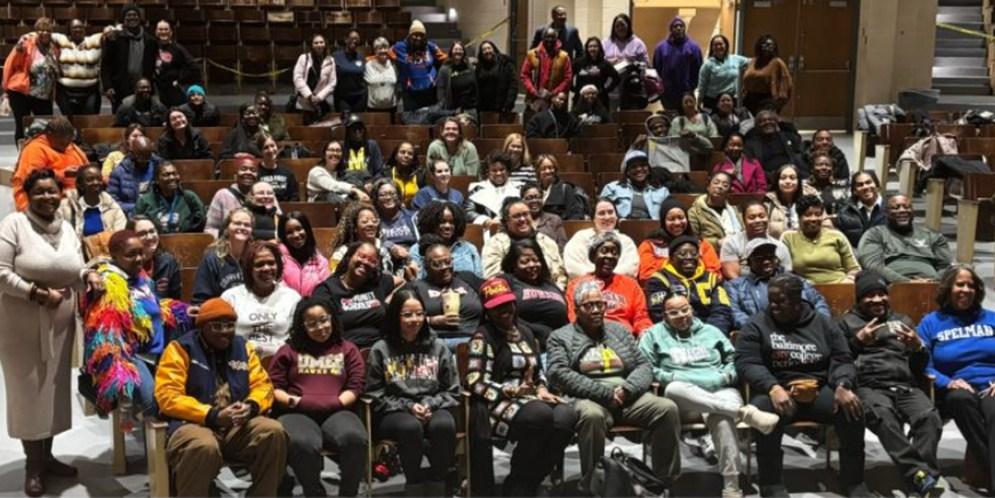
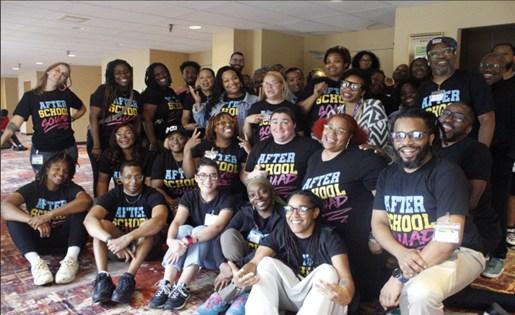

(ABOVE, LtoR) Lawrence T. Brown of the Black Butterfly Project and a group photograph of Community Schools participants. (BELOW, LtoR) Tina Hike-Hubbard, Chief Communications and Engagement Officer for BCPS, Principal April Myrick of Patterson High School, and FamilyLeague team members Jenee Tucker, Danielle Tidline, Deyara Martin, Reginald Grant, and Tiffany Snead Rhodes.
(ABOVE, LtoR) Lawrence
Brown of the Black Butterfly Project and a group photograph of Community Schools participants. (BELOW, LtoR) Tina Hike-Hubbard, Chief Communications and Engagement Officer for BCPS, Principal April Myrick of Patterson High School, and Family League team members Jenee Tucker, Danielle Tidline, Deyara Martin, Reginald Grant, and Tiffany Snead Rhodes.
Student Absenteeism: A Community-Wide Priority
Family League recognizes the critical challenge of student absenteeism in Baltimore City schools, where data shows chronic absence rates affecting 48% of students in the 2023 -2024 school year. While encouraging progress has been made with first-quarter rates dropping to 34% this issue requires sustained, collaborative attention from all community partners.
As an organization deeply invested in Baltimore's youth development ecosystem, Family League understands that attendance challenges intersect with broader systems coordinated through Community Schools and Out-of-School Time programming. Baltimore’s network of 154 Community Schools provides unique insights into the multifaceted nature of attendance barriers, from transportation access to family engagement needs.
Further advancing detailed attendance analysis aligns with Family League's evidence-based approach to community impact. Through its existing data collection and evaluation processes across 69 funded Community Schools, Family League has observed how comprehensive support systems can positively influence student engagement and attendance patterns. Family League’s summer programs' 86% average daily attendance rate demonstrates the effectiveness of welldesigned, accessible youth programming.
Family League supports Baltimore City Mayor Brandon Scott and City Council's efforts to better understand and address absenteeism through data-driven solutions. This approach resonates with our own commitment to using evidence-based strategies for improving youth outcomes.
Key Areas for Growth
The Wallace Foundation study identifies four crucial areas for continued development. First, responding to post-pandemic youth needs, particularly in mental and emotional health. Second, advocating for equitable OST programs. Third, leveraging partnerships to support families, and finally, advancing systemic equity in OST systems. As one participant in the study noted, OST intermediaries possess unique advocacy capabilities: "They're able to advocate differently than us as individual organizations...It's getting in front of the 'right people' who have the ability to enact changes or to move resources differently."
Through our combined efforts at Family League, we continue to demonstrate the vital role of OST intermediaries in building robust, responsive youth development systems. Our work extends beyond immediate programming needs to contribute to long-term systemic changes that benefit Baltimore's youth and families.
This commitment to comprehensive support is particularly evident in our summer programming outcomes, which achieved both broad reach and deep impact across diverse communities. By maintaining focus on quality programming while adapting to meet emerging needs, Family League exemplifies the expanded role of OST intermediaries described in the Wallace Foundation study –serving not just as program coordinators but as essential partners in creating more equitable and effective youth development systems.
Urban Cipher
Together, B'More For Healthy Babies and Family League Community Advisory Board members, participated in "The Black Butterfly Dream Lab" workshop in December. Led by Dr. Lawrence Brown of the Black Butterfly Academy and Morgan State University School of Community Health and Policy, this interactive gaming experience explored the intersections of urban apartheid and equitable society building.
Dr. Brown, who serves as principal investigator for Family League's Community Health Needs Assessment, guided participants through an immersive experience that bridged Baltimore's historical patterns of segregation with contemporary health and economic disparities. The workshop created a unique space for service providers to examine how past policies continue to shape present-day outcomes for children, youth, and families across the city.
Through the gaming framework, participants deepened their understanding of applying health equity principles to their direct service work. The interactive format encouraged stakeholders to consider how historical segregation patterns have created lasting impacts on both community health outcomes and wealth distribution. This perspective proved particularly valuable for those implementing social and nonprofit programs throughout Baltimore.
The workshop demonstrated how understanding historical context is crucial for developing effective, equity-focused interventions. By connecting past policies to present challenges, participants gained practical insights for creating more holistic and comprehensive approaches to serving Baltimore's communities.
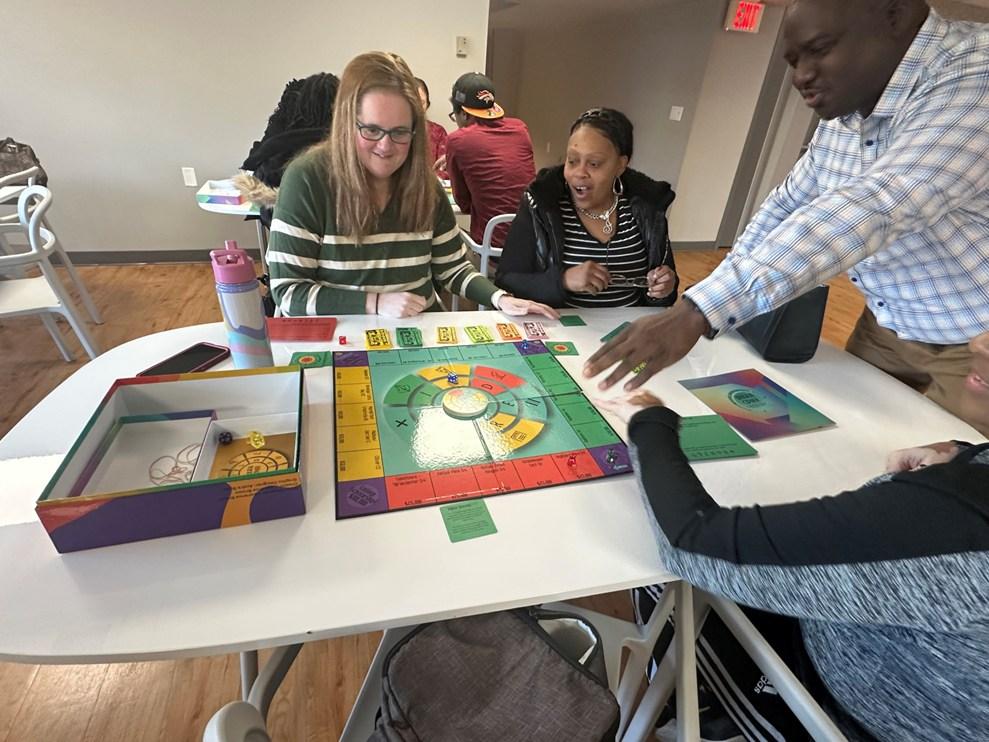



1734 Maryland Avenue 3rd Floor Baltimore, MD 21201 (410) 662-5500 familyleague.org
Family League of Baltimore is a 501(c)(3) nonprofit organization and the designated Local Management Board for the City of Baltimore. Since 1991, it has served as an architect of change by promoting datadriven, collaborative initiatives and aligning resources to create lasting outcomes for children, families, and communities.
BOARD OF DIRECTORS
Nancy Blackwell, Chair
Nicole Earle, Treasurer
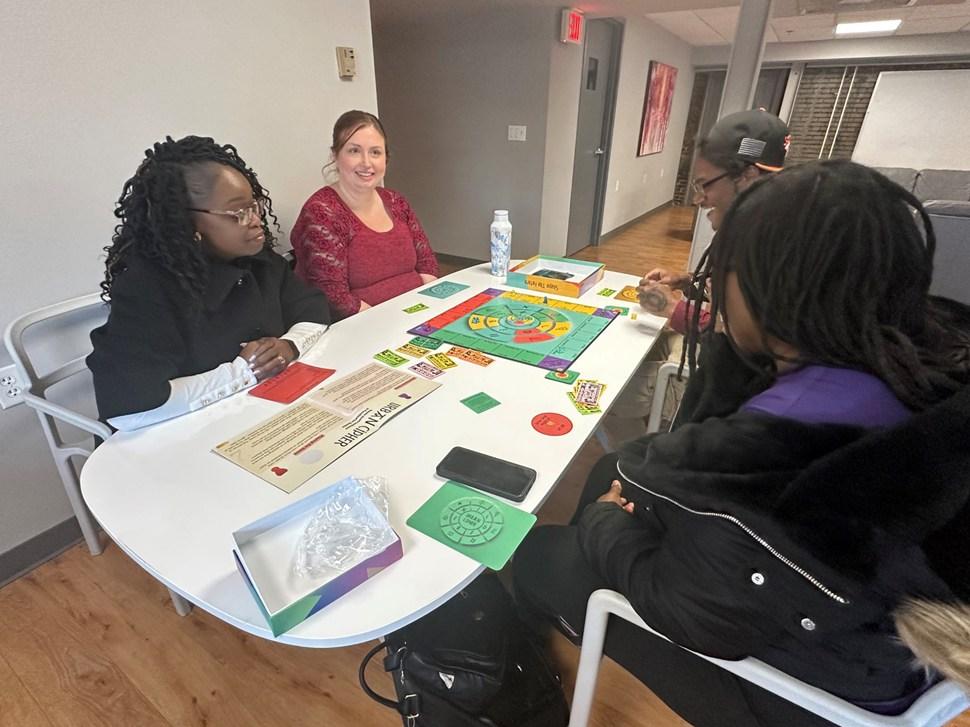

Barry S. Solomon, MD, MPH, Secretary
Ben Perez
Ramsey L. Harris
Joshua M. Sharfstein, MD
Ex-Officio Members
Debra Y. Brooks, Ed.D Mayor’s Office of Children and Family Success
Tina Hike-Hubbard, Baltimore City Public Schools
Charles Jackson, Baltimore City Health Department
Demaune Millard, Family League
Corrine Mullings, LMSW, Baltimore City Department of Social Services
Anjelene Branch, Baltimore City Department of Juvenile Services
Lynn Mumma, Behavioral Health Systems Baltimore
LEADERSHIP TEAM
Demaune Millard President & CEO
Keianna Thompson Chief Financial Officer
Jonathan Carter Chief of Staff
GET SOCIAL WITH




Jenee Tucker Sr. Director for Community Impact
Melissa Moore Sr. Director for Community Impact
Dara Gray Sr. Director of Innovation and Technology
linkedin.com/company/family-league
Family League of Baltimore
@family_league
@Family_League
